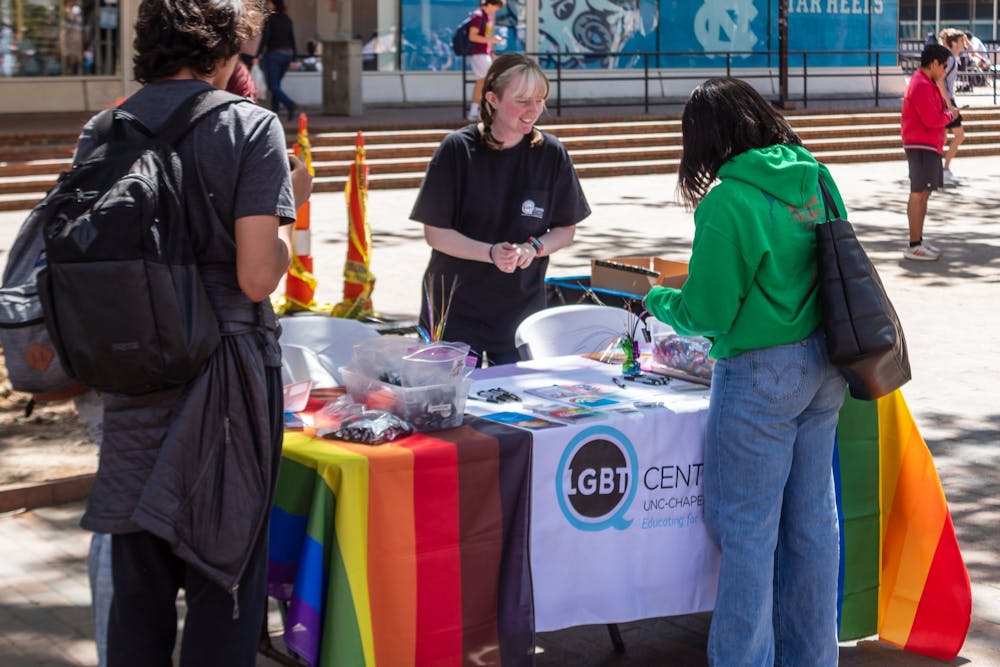Queer People of Faith is an interfaith LGBTQ+ organization that explores the intersections of faith, gender identity and sexual orientation.
Out in Science, Technology, Engineering and Mathematics, known as oSTEM, is a group that aims to empower queer people in STEM.
Pride @Kenan-Flagler Business School is an organization that seeks to increase queer visibility at Kenan-Flagler and foster a sense of community among LGBTQ+ students.
Other undergraduate LGBTQ+ organizations include queer_hack, Q-connect & OUTreach, Queer and Transgender People of Color and Carolina Advocating for Gender Equity.
Graduate and professional organizations
The University also hosts a number of organizations specifically to aid LGBTQ+ members of UNC’s graduate and professional community.
OutLaw, formerly known as Lambda Law Students Association, is an organization that aims to educate the UNC law community about the social, legal and political issues faced by members of the LGBTQ+ community.
Medical Student Pride Alliance is a group that aims to support the success of LGBTQ+ medical students.
LGBdenTQIA+ is a community for queer students and allies within the Adams School of Dentistry.
Other graduate and professional organizations include Checked OUT, the LGBT Caucus, Health Sciences LGBTQ Alliance, Kenan-Flagler Business School Pride Club, LGBTQ Health Disparities Research Collaborative and Queer Graduate and Professional Students.
Gender violence service coordinators
Coordinators who work as part of UNC’s Violence Prevention and Advocacy Services provide year-round confidential support to members of the campus community. This can include anyone looking to share their experiences, seek further support or ask questions.
To get the day's news and headlines in your inbox each morning, sign up for our email newsletters.
Holly Lovern and Connor McCaffrey, gender violence services coordinators within the University Office of Student Affairs, said that they wish more students knew about different kinds of services coordinators provide.
“Sometimes folks just have a couple of questions for us and we have a 15-20 minute meeting and then that's it,” Lovern said. “Sometimes we’re providing ongoing support for folks just depending on what they’re looking for.”
Lovern said that gender violence services coordinators receive training on how to handle the intersection of gender violence and LGBTQ+ identities, saying that people who choose to speak with coordinators are not required to share anything about their identities.
The gender violence services coordinators are available to meet via appointment and also hold drop-in hours in the LGBTQ Center during the academic year.
Safe Zone Program
The Safe Zone Program aims to create a network of visible allies to members of the LGBTQ+ campus community. Safe Zone training sessions inform participants about concepts, terminology and resources pertaining to sexual orientation, gender identity and gender expression.
Carolina Pride Alum Network
The Carolina Pride Alum Network is a group of alumni, faculty and staff that seeks to engage LGBTQ+ alumni and foster community at UNC. With about 1,500 members and chapters in several major cities, the network supports service and advocacy events, as well as sponsoring social and networking opportunities.
Shawne Grabs, a senior regional development officer for the University Development office, oversees the alumni network. Grabs said that the network hopes to provide a culture of support and community that may not have been present when alumni attended UNC.
“We're trying to really grow our group. We know there are more than 1,500 queer alumni out there, and so our goal is to try to let people know and market ourselves,” Grabs said.
LGBTQ+ scholarships, fellowships and grants
LGBTQ+ students and allies may be eligible to apply for specific scholarships such as Point Foundation Scholarships and the Pine Tree Scholarship. Queer-focused internships, fellowships and research grants are also available.
Sexuality studies program
Programs in sexuality studies are a part of the Department of Women’s and Gender Studies and contain a wide variety of courses, an undergraduate interdisciplinary minor and a graduate studies group.
The minor in sexuality studies consists of five courses from at least three different departments, with approved classes ranging from those in the Religious Studies to English departments.
Campus Health services
Providers within Campus Health receive training and continued medical education to ensure they provide high-quality care to students of all gender identities and sexual orientations.
Nurse practitioner Stephanie Edwards-Latchu is one of the Campus Health providers who helps offer gender affirming care. She said Campus Health offers sexual health services, hormone therapy and transition-related care. All students and postdoctoral fellows who pay the Campus Health fee, which is listed as a mandatory charge on degree-seeking students' University account, are eligible to use Campus Health services.
“We don't want patients to feel like they can't come see us because of who they are or who they love,” Edwards-Latchu said.
@dailytarheel | university@dailytarheel.com




